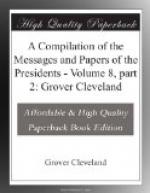I am, gentlemen, your obedient servant,
MILLARD FILLMORE.
THIRD ANNUAL MESSAGE.
WASHINGTON, December 6, 1852.
Fellow-Citizens of the Senate and of the House of Representatives:
The brief space which has elapsed since the close of your last session has been marked by no extraordinary political event. The quadrennial election of Chief Magistrate has passed off with less than the usual excitement. However individuals and parties may have been disappointed in the result, it is, nevertheless, a subject of national congratulation that the choice has been effected by the independent suffrages of a free people, undisturbed by those influences which in other countries have too often affected the purity of popular elections.
Our grateful thanks are due to an all-merciful Providence, not only for staying the pestilence which in different forms has desolated some of our cities, but for crowning the labors of the husbandman with an abundant harvest and the nation generally with the blessings of peace and prosperity.
Within a few weeks the public mind has been deeply affected by the death of Daniel Webster, filling at his decease the office of Secretary of State. His associates in the executive government have sincerely sympathized with his family and the public generally on this mournful occasion. His commanding talents, his great political and professional eminence, his well-tried patriotism, and his long and faithful services in the most important public trusts have caused his death to be lamented throughout the country and have earned for him a lasting place in our history.
In the course of the last summer considerable anxiety was caused for a short time by an official intimation from the Government of Great Britain that orders had been given for the protection of the fisheries upon the coasts of the British Provinces in North America against the alleged encroachments of the fishing vessels of the United States and France. The shortness of this notice and the season of the year seemed to make it a matter of urgent importance. It was at first apprehended that an increased naval force had been ordered to the fishing grounds to carry into effect the British interpretation of those provisions in the convention of 1818 in reference to the true intent of which the two Governments differ. It was soon discovered that such was not the design of Great Britain, and satisfactory explanations of the real objects of the measure have been given both here and in London.




